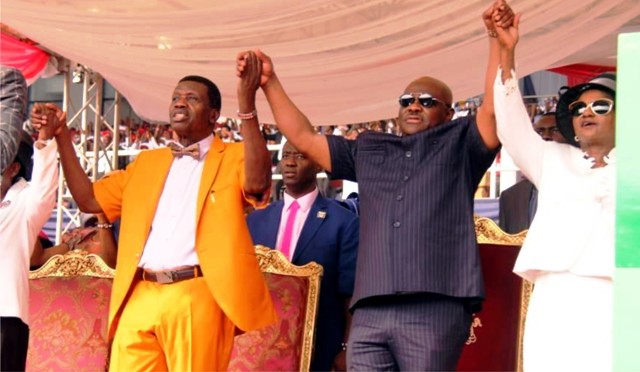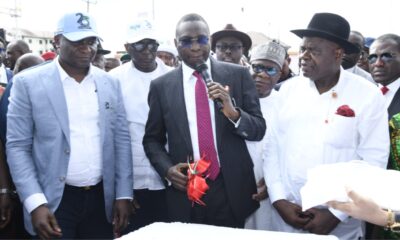Featured
Buhari Is President Of Katsina …As Balarabe Musa Warns Against Second Term Bid – Afenifere Leader

Elder statesman and a chieftain of a Yoruba socio-political organisation, Afenifere, Ayo Adebanjo has accused President Muhammadu Buhari of reducing himself to President of Katsina.
Adebanjo was reacting to a statement written by former President Olusegun Obasanjo, rubbishing the Buhari-led government.
The leader of the influential Afenifere group, also addressed the issue of restructuring, saying it should be clear now to Buhari and all those opposed to it that it was the solution to the key challenges facing the country.
He said, “If Buhari has been sincere about keeping Nigeria together in peace, he should have called them to address their grievances but he intimidated and wanted to butcher and kill them in their land. It shows in everything that he does that he is the President of Katsina State and not of Nigeria!”
Speaking on Obasanjo’s letter, the elder statesman said, “When Obasanjo said both APC and PDP cannot take us anywhere, I agree with him. But any party Obasanjo is interested in, I am out of it because Obasanjo will not support anything except he has vested interest. I am interested in the message and not the messenger on this occasion.”
Former President Olusegun Obasanjo painted a gloomy picture of the state of the nation under the Buhari administration in his letter to the President. Is the situation that bad? It is very perilous. We are in a situation where the captain does not have a clue on how to save his ship. Things are so bad and he feels he is doing his best. And his supporters are not helping him.
They don’t seem to tell him the true situation of the country. There is no petrol, the roads are bad, electric power is irregular; he promised to create about three million jobs each year but people have been losing about six million jobs every year.
And the best his spokesperson will say is that “we are doing our best and you will soon see the result”.
One of them said they were doing investigation on the killings in Benue. Buhari has no capacity to defend the people and one of the obligations of his office is to safeguard lives and property. And to imagine that the killings have continued is the worst dereliction of duty on the part of the President.
It is so unfortunate that the President has not said a word of condolence to the people of Benue since the herdsmen’s attacks started.
Even when the people requested to see him, he did not invite them. He didn’t consider the situation grievous enough to sympathize with them. When they later decided to see him, he didn’t even feel remorseful to tell them ‘sorry’. What he told them was to go and accommodate herdsmen.
To show you how callous Buhari and this government are, the day following the massacre in Benue, some APC governors went to the state to declare their full support for his election in 2019. The government was elected on the mantra of anti-corruption.
Is it not sad that some of those he appointed into his cabinet which took six month to constitute have corruption allegations hanging on their necks and he turned a blind eye? And was it not until when people began to shout about SGF Babachir Lawal who was indicted for corruption that he was sacked and the EFCC recently went after him? This is an administration that says it has zero tolerance for corruption. The Minister of Interior collaborated with the Attorney-General of the Federation to meet with a suspected looter of pension funds in a foreign country and these officers have remained untouched.
Buhari and APC were not elected to give excuses for non-performance, they were elected to make our lives worthwhile, that is the mandate we gave them. They were not elected to protect criminals, murderers. It is extreme tolerance to allow them stay till 2019. If they truly understand what restructuring is, they will know that it is the key to all these challenges, even to insecurity.
Meanwhile, Leader of the Conference of Nigerian Political Parties (CNPP), Alhaji Balarabe Musa, has advised President Muhammadu Buhari, not to stand for re-election in 2019.
Musa said Buhari’s administration had failed to protect Nigerians from poverty and security challenges in the country.
Speaking in reaction to former President Olusegun Obasanjo’s memo to Buhari over the state of the nation, Musa made it clear that Obasanjo was part of those that campaigned in 2015 to remove former president, Dr Goodluck Jonathan.
“In the first place, is Obasanjo deceiving us? This is because Obasanjo is one of those who supported Buhari for the Presidency as a civilian candidate. Didn’t he know Buhari more than we know him, as they were in the Army together and were doing everything together? In 2015, Obasanjo knew Buhari more than we civilians ever knew him, and he recommended him for the Presidency.
“Now, he can regret ever recommending Buhari for certain reasons. Did he express such regret in his letter? Why does he want us to believe him if he is not suitable for 2019? We already know that Buhari’s government is a failure. Let us make our own decision. The situation in Nigeria today is terrible. Is this a government?” he queried.
Musa argued further: “The state of the nation is negative and it has been so since the Army took over since 1966. For some years after Army take over, we have seen traces of improvement, particularly in the case of national unity. But after four years of military rule, we saw the negative state of Nigeria growing even more.
“Now, the state of the nation in many respects has gone so bad. What we expect would happen would inevitably happen. There will be a constitutional or proletarian revolution in Nigeria with the present situation. Whether we like it or not, if constitutional revolution will not work, there would be a proletarian revolution, because the state of the nation is so negative and people are suffering so much.
“The economy is in the dark and this government is not capable of providing solution. We must change the philosophy of basing things on self-interest first and public interest second or even secondary. Otherwise, we have to change the social economic and political system controlling all areas of development in the country.
“We can do this effectively by bring in the leading role of the state in the economic development to ensure peace, equality, dignity of the human person and progressive development of the country. You cannot do this by market economy, which has never progressed any country since after the world wars and colonialism,” Musa said.
Featured
Tinubu Signs Four Tax Reform Bills Into Law …Says Nigeria Open For Business

President Bola Tinubu yesterday signed into law four tax reform bills aimed at transforming Nigeria’s fiscal and revenue framework.
The four bills include: the Nigeria Tax Bill, the Nigeria Tax Administration Bill, the Nigeria Revenue Service (Establishment) Bill, and the Joint Revenue Board (Establishment) Bill.
They were passed by the National Assembly after months of consultations with various interest groups and stakeholders.
The ceremony took place at the Presidential Villa, yesterday.
The ceremony was witnessed by the leadership of the National Assembly and some legislators, governors, ministers, and aides of the President.
The presidency had earlier stated that the laws would transform tax administration in the country, increase revenue generation, improve the business environment, and give a boost to domestic and foreign investments.
“When the new tax laws become operational, they are expected to significantly transform tax administration in the country, leading to increased revenue generation, improved business environment, and a boost in domestic and foreign investments,” Special Adviser to the President on Media, Bayo Onanuga said on Wednesday.
Before the signing of the four bills, President Tinubu had earlier yesterday, said the tax reform bills will reset Nigeria’s economic trajectory and simplify its complex fiscal landscape.
Announcing the development via his official X handle, yesterday, the President declared, “In a few hours, I will sign four landmark tax reform bills into law, ushering in a bold new era of economic governance in our country.”
Tinubu made a call to investors and citizens alike, saying, “Let the world know that Nigeria is open for business, and this time, everyone has a fair shot.”
He described the bills as not just technical adjustments but a direct intervention to ease burdens on struggling Nigerians.
“These reforms go beyond streamlining tax codes. They deliver the first major, pro-people tax cuts in a generation, targeted relief for low-income earners, small businesses, and families working hard to make ends meet,” Tinubu wrote.
According to the President, “They will unify our fragmented tax system, eliminate wasteful duplications, cut red tape, restore investor confidence, and entrench transparency and coordination at every level.”
He added that the long-standing burden of Nigeria’s tax structure had unfairly weighed down the vulnerable while enabling inefficiency.
The tax reforms, first introduced in October 2024, were part of Tinubu’s post-subsidy-removal recovery plan, aimed at expanding revenue without stifling productivity.
However, the bills faced turbulence at the National Assembly and amongst some state governors who rejected its passing in 2024.
At the NASS, the bills sparked heated debate, particularly around the revenue-sharing structure, which governors from the North opposed.
They warned that a shift toward derivation-based allocations, especially with VAT, could tilt fiscal balance in favour of southern states with stronger consumption bases.
After prolonged dialogue, the VAT rate remained at 7.5 per cent, and a new exemption was introduced to shield minimum wage earners from personal income tax.
By May 2025, the National Assembly passed the harmonised versions with broad support, driven in part by pressure from economic stakeholders and international observers who welcomed the clarity and efficiency the reforms promised.
In his tweet, Tinubu stressed that this is just the beginning of Nigeria’s tax evolution.
“We are laying the foundation for a tax regime that is fair, transparent, and fit for a modern, ambitious Nigeria.
“A tax regime that rewards enterprise, protects the vulnerable, and mobilises revenue without punishing productivity,” he stated.
He further acknowledged the contributions of the Presidential Fiscal Policy and Tax Reform Committee, the National Assembly, and Nigeria’s subnational governments.
The President added, “We are not just signing tax bills but rewriting the social contract.
“We are not there yet, but we are firmly on the road.”
Featured
Senate Issues 10-Day Ultimatum As NNPCL Dodges ?210trn Audit Hearing

The Senate has issued a 10-day ultimatum to the Nigerian National Petroleum Company Limited (NNPCL) over its failure to appear before the Senate Committee on Public Accounts probing alleged financial discrepancies amounting to over ?210 trillion in its audited reports from 2017 to 2023.
Despite being summoned, no officials or external auditors from NNPCL showed up yesterday.
However, representatives from the representatives of the Economic and Financial Crimes Commission, Independent Corrupt Practices and Other Related Offences Commission and Department of State Services were present.
Angered by the NNPCL’s absence, the committee, yesterday, issued a 10-day ultimatum, demanding the company’s top executives to appear before the panel by July 10 or face constitutional sanctions.
A letter from NNPCL’s Chief Financial Officer, Dapo Segun, dated June 25, was read at the session.
It cited an ongoing management retreat and requested a two-month extension to prepare necessary documents and responses.
The letter partly read, “Having carefully reviewed your request, we hereby request your kind consideration to reschedule the engagement for a period of two months from now to enable us to collate the requested information and documentation.
“Furthermore, members of the Board and the senior management team of NNPC Limited are currently out of the office for a retreat, which makes it difficult to attend the rescheduled session on Thursday, 26th June, 2025.
“While appreciating the opportunity provided and the importance of this engagement, we reassure you of our commitment to the success of this exercise. Please accept the assurances of our highest regards.”
But lawmakers rejected the request.
The Committee Chairman, Senator Aliyu Wadada, said NNPCL was not expected to submit documents, but rather provide verbal responses to 11 key questions previously sent.
“For an institution like NNPCL to ask for two months to respond to questions from its own audited records is unacceptable,” Wadada stated.
“If they fail to show up by July 10, we will invoke our constitutional powers. The Nigerian people deserve answers,” he warned.
Other lawmakers echoed similar frustrations.
Senator Abdul Ningi (Bauchi Central) insisted that NNPCL’s Group CEO, Bayo Ojulari, must personally lead the delegation at the next hearing.
The Tide reports that Ojulari took over from Mele Kyari on April 2, 2025.
Senator Onyekachi Nwebonyi (Ebonyi North) said the two-month request suggested the company had no answers, but the committee would still grant a fair hearing by reconvening on July 10.
Senator Victor Umeh (Anambra Central) warned the NNPCL against undermining the Senate, saying, “If they fail to appear again, Nigerians will know the Senate is not a toothless bulldog.”
Last week, the Senate panel grilled Segun and other top executives over what they described as “mind-boggling” irregularities in NNPCL’s financial statements.
The Senate flagged ?103 trillion in accrued expenses, including ?600 billion in retention fees, legal, and auditing costs—without supporting documentation.
Also questioned was another ?103 trillion listed under receivables. Just before the hearing, NNPCL submitted a revised report contradicting the previously published figures, raising more concerns.
The committee has demanded detailed answers to 11 specific queries and warned that failure to comply could trigger legislative consequences.
Featured
17 Million Nigerians Travelled Abroad In One Year -NANTA

The National Association of Nigerian Travel Agencies (NANTA) said over 17 million Nigerians travelled out between 2023 and 2024.
This is as the association announced that it would be organising a maiden edition of Eastern Travel Market 2025 in Uyo, Akwa Ibom State capital from 27th to 30th August, 2025.
Vice Chairman of NANTA, Eastern Zone, Hope Ehiogie, disclosed this during a news briefing in Port Harcourt.
Ehiogie explained that the event aims to bring together over 1,000 travel professionals to discuss the future of the industry in the nation and give visibility to airlines, hospitality firms, hospitals and institutions in the South-South and South-East, tagged Eastern Zone.
He stated that the 17 million number marks a significant increase in overseas travel and tours.
According to him, “Nigerian travel industry has seen significant growth, with 17 million people traveling out of the country in 2023”.
Ehiogie further said the potential of tourism and travel would bring in over $12 million into the nation’s economy by 2026, saying it would be a major spike in the sector, as 2024 recorded about $4 million.
“The potential of tourism and travel is that it can generate about $12 million for the nation’s economy by 2026. Last year it was $4 million.
“In the area of travels, over 17 million Nigerians traveled out of the country two years ago for different purposes. This included, health, religious purposes, visit, education and others,” Ehiogie said.
While highlighting the potential of Nigeria’s tourism, he said the hospitality industry in Nigeria has come of age, saying it is now second to none.
The Vice Chairman of NANTA, Eastern Zone further said, “We are not creating an enabling environment for business to thrive. We need to support the industry and provide the necessary infrastructure for growth.”
He said the country has a lot of tourism potential, especially as the government is now showing interest in and supporting the sector.
Ehiogie emphasized that NANTA has been working to support the industry with initiatives such as training schools and platforms for airlines and hotels to sell their products.
He added, “We now have about four to five training schools in the region, and within two years, the first set of students will graduate. We are helping airlines sell tickets and hotels sell their rooms.”
Also speaking, former Chairman of the Board of Trustees of NANTA, Stephen Isokariari of Dial Travels, called for more support from the industry.
Isokariari stated, “We need to work together to grow the industry and contribute to the nation’s Gross Domestic Product.
“With the right support and infrastructure, the Nigerian travel industry has the potential to make a significant contribution to the nation’s economy.”
-
Sports5 days ago
Spanish Football Fires Entire Refereeing Committee
-

 Features4 days ago
Features4 days agoBetween EFCC And NDDC: Strategic Alliance For Niger Delta
-

 News4 days ago
News4 days agoCourt Sentences Gospel Singer To Death For Killing Girlfriend In Nasarawa
-

 Politics4 days ago
Politics4 days agoMakinde Renames Polytechnic After Late Ex-Gov
-
Sports5 days ago
Olympic Day Sparks Nationwide Fitness Fever
-

 Nation4 days ago
Nation4 days agoOgoni Stakeholders Hail Zabbey’s Performance
-
Sports5 days ago
I Joined Saudi League To Win Titles – Senegal Keeper
-

 Niger Delta4 days ago
Niger Delta4 days agoOBALGA Sole Administrator Presents Brand New Fire Extinguishers To Council …Commiserates With Traders Over Rumuomasi Market Fire Incident …Commences Desilting Of Drainages

